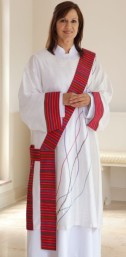WHAT IS A DISTINCTIVE DEACON?
ANSWERING SOME QUESTIONS
“So what is a distinctive (or vocational) deacon?
How are deacons different from priests or Readers or lay ministers?
What do you do that makes you ‘distinct’ from other ministries?”

(image from proofthatblog.com)
People often ask these questions, and this short paper aims to provide an introduction and explain why we deacons believe our vocation and ministry is distinct from other ministries in the Church of England.
The first mention of diaconal ministers is found in Acts 6: 1-7. With the very rapid growth of the first church, the apostles found that the practical running of the community was taking them away from their priorities, which were to preach and to pray. Their solution was to choose seven men, full of faith and the Holy Spirit, to take over this task. These seven were prayerfully chosen by the whole church, and the apostles laid hands on them as a public witness to their calling.
Deacons have therefore, from the very beginning, been part of the way the church of Christ organises itself. Women were included from earliest times, for instance Phoebe, whom Paul mentions in his epistle (Romans 16:1-2)
Since then, deacons have always been ordained ministers and became part of the church’s three-fold ministry of bishop, priest and deacon. Originally deacons were answerable primarily to the bishop with whom they worked closely, and they organised the charitable work of the church. Well-known deacons include St Laurence and St Francis of Assisi.
Things have changed over the centuries. All ordained people now start out as deacons, and most become priests after a year – known as ‘transitional’ deacons. But for some of us, being a deacon is a vocation in its own right, the path to which God has called us. These days, the deacon is often answerable to the incumbent of the parish where we minister, although we continue to have a special relationship with the Bishop. But the fundamental principle of our vocation remains the same: that we are people who care for those in all kinds of need, and encourage the church to do the same. We remind the church of God’s calling to us all.
However, deacons don’t only organise care in our communities. We are also ministers of the Gospel of Christ. In the Eucharistic liturgy, we read the Gospel; and in our daily ministry, we encourage the church to share that Gospel outside the walls of the church.
This is reflected in the Bishop’s words in the Ordinal, in the service of the Ordination of Deacons:
Bishop: Deacons are called to work with the Bishop and the priests with whom they serve as heralds of Christ’s kingdom. They are to proclaim the gospel in word and deed, as agents of God’s purposes of love. They are to serve the community in which they are set, bringing to the Church the needs and hopes of all the people. They are to work with their fellow members in searching out the poor and weak, the sick and lonely and those who are oppressed and powerless, reaching into the forgotten corners of the world, that the love of God may be made visible.
Deacons share in the pastoral ministry of the Church and in leading God’s people in worship. They preach the word and bring the needs of the world before the Church in intercession. They accompany those searching for faith and bring them to baptism. They assist in administering the sacraments; they distribute communion and minister to the sick and housebound.
Deacons are to seek nourishment from the Scriptures; they are to study them with God’s people, that the whole Church may be equipped to live out the gospel in the world. They are to be faithful in prayer, expectant and watchful for the signs of God’s presence, as he reveals his kingdom among us.
There are many deacons in the Anglican Communion all over the world, and you’ll find deacons in the Roman Catholic, Orthodox and Methodist churches too.

Deacons as part of the mission and ministry of the whole church
The report of the Church of England’s Faith and Order Advisory Group, the Mission and Ministry of the Whole Church (2007) says this about the work and role of a deacon:
The first thing to say about deacons, in the light of the pivotal use of the terms diakonia and diakonos in the New Testament, especially by St Paul, is that deacons, in their ordination, receive the fundamental commissioning of Christ to be ministers (diakonoi) of the gospel. St Ignatius of Antioch calls them ‘deacons of the mysteries of Jesus Christ’ (cf. 1 Corinthians 4.1). They are sent by Christ, through the Church, as bearers of the Good News to the world and in this role they have a special compassionate care for the needs of the sick, the lonely and the oppressed. Together with all Christians and all ministers, theirs is a life of compassionate service in obedience to Christ’s command and example – service primarily of Christ and under his authority, secondarily of those who are Christ’s and to whom he imparts his authority.
Deacons, like priests, bishops and lay ministers, are related to the word, the sacraments and pastoral care: they receive the full ministry of the gospel.
So what is distinctive about us? What makes our vocation and the understanding of our own ministry different from that of priests, bishops and lay workers?

The distinctive ministry of deacons
Deacons are boundary-crossers. We are always looking ‘out’ from the church, asking how the church and the Christian faith can cross the boundary with the gospel to those who do not yet know Christ, and to those who are in need. This generally means that people with a diaconal calling do not wish to spend most of their ministry inside the church building. The distinctive diaconate is for those who are strongly drawn to the go-between ministry, seeking out the lost sheep and bringing both the message of the gospel and the practical care that goes with it to the unchurched.
As those who cross boundaries, make connections and bring people together, deacons are well- placed to move into challenging new contexts. We are risk-takers, but work collaboratively. We are able to build networks of relationships with community agencies and individuals, working with others to build healthy neighbourhoods.
For example, some deacons work with the homeless, with refugees, with addicts, with children excluded from school, with food banks, with sex workers and with Aids sufferers. We advocate for the poor and for justice, not only working with individuals and organisations but also speaking truth to power as the prophets of the church.
Others are ‘embeds’ in their community or at their workplace, starting new projects, supporting current ones, looking for fresh ways to connect with people, developing servant leadership at work. One deacon advises a bishop on mission in the workplace. Another deacon is a chaplain to a racecourse. One acts as a lollipop lady, building relationships with her neighbours. Another creates community musicals, connecting her church with those outside it.
Yet other deacons are involved in reconciliation, or inter-faith work

Deacon Jess Foster, Diocese of Birmingham
or mission and evangelism, often with pioneer ministers and fresh expressions of churches. We are constantly encouraging the church to look outwards and share the gospel with our communities: setting up bereavement visiting teams, ministering to those with dementia and their families, starting stay and play groups, developing creative worship, heading up the church’s response to human need.
We all have one thing in common: we prefer to be out and about in the community. A deacon is a person on a mission, a messenger or ambassador – making connections between liturgy and pastoral need, building bridges between the life of the Church and the community.
To do this well, deacons need to be free to focus on this ministry. Thus, while it is a vital truth that priestly ministry is founded on and embraces all of diaconal ministry, distinctive deacons are free to devote all our time and energy to diaconal ministry because we do not have the additional responsibilities entrusted to priests to lead the church in its worship and life. This gift to the church of ordained ministers, who can be out on mission all the time, is surely one to be encouraged and treasured.
Deacons as signs of God’s kingdom
The deacon is an agent of the kingdom of God, invested with authority from Christ at ordination. The deacon’s ministry is a visible sign that draws attention to the nature of the Church as the Body of Christ. Deacons remind the church of why it is here: to carry the good news of Christ and his kingdom to those who do not yet know his love. As agents of God’s kingdom, we are a sign that the kingdom or reign of God has dawned upon the world in the mission of Jesus Christ, but remains to be fulfilled, and it points to the role of the Church in the coming of God’s kingly reign.
The role of deacons in the Eucharistic liturgy
All these aspects of diaconal ministry are represented in the role of the deacon in the services of the church. For the Eucharist and other sacramental services, we deacons wear our stole across the body, distinct from the way of priests. In some churches deacons wear a dalmatic robe which again distinguishes us from other ministries.


As ministers of the Gospel, it is the deacon’s role to read the gospel, reminding the whole church that it is meant to be shared, not kept within the confines of the faithful. Deacons encourage the church’s intercession, bringing the needs of others outside across the church boundary into the liturgy. Deacons prepare the holy table for the Eucharist, reminding the whole church that we are called to prepare for Christ’s coming. Deacons embody the nature and purpose of the church as we proclaim the mystery of Christ in the Eucharistic prayer: ‘Christ has died: Christ is risen: Christ will come again!’
Deacons lift the chalice alongside the priest with the paten, affirming the collaborative nature of their ministry with others.

Deacons clear up after the Eucharist, reminding the church of the humble tasks to which Christ calls us all: and deacons dismiss the congregation at the end, sending them out to live the gospel in everyday life.
What do vocations officers look for in diaconal enquirers?
The National Ministry Development Team of the Church of England have now produced Six Qualities, to help discern diaconal vocation, followed by Evidences, to see how people are inhabiting these qualities during their training and curacies.
To sum up
A ‘distinctive’ (or ‘vocational’) deacon is someone who has some of these characteristics:
- a longing to be out and about in the community rather than based inside the church building
- a desire to meet the needs of others
- a heart and passion for sharing Christ with others
- a commitment to helping the church look outwards to their neighbourhood and to the world
- an interest in peace or justice issues
- a desire to focus mainly on opportunities for mission and service
- a creative and/or practical approach
- enjoyment in working collaboratively
- the courage to take risks wisely
For ideas for further reading and information, see this blog ‘Deacon’ and visit the Page Tab ‘Useful books and papers’ https://deaconstories.wordpress.com/some-useful-books-and-papers/
For further exploration, talk first to your parish priest, and go to the vocations page of your diocesan website, where you’ll find relevant contact details of your vocations advisers.
With thanks to Canon Rosalind Brown for her guidance and support.
Deacon Gill Kimber
deaconsonthemove@gmail.com
